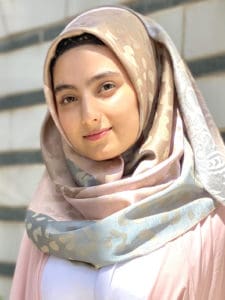Education as a Tool for Peacebuilding in Afghanistan. Member Spotlight: Parisa Sekandari
Parisa Sekandari is a recent graduate from Herat University in Afghanistan, receiving a Bachelors of Law and Political Science degree. She is also a country director for the Afghanistan Vis Alumni Network which is an organization that works with universities students from 15 -20 universities to help students to participate in the international law competitions. She also worked as a regional coordinator at Afghans For Progressive Thinking, which focused on supporting university students learn debating, critical thinking, leadership, and peacebuilding skills.
Watch this powerful video on the current situation of Afghanistan that several MBBI members created.
Who is she? What is her background?
 After the fall of Afghanistan in the hand of the Taliban, she moved to Australia. Initially, she believed that the peacebuilding in Afghanistan before the Taliban took over was going well. She champions the changes that occurred in Afghanistan during the last 20 years, especially at the university level, including student and teacher, both female and male. “Through Afghans for Progressive Thinking, we started training for student and teacher relations and we can see the result. The main purpose of the training was providing students the tools in peacebuilding and leadership. It was like a chain, one student will deliver it to another student, and one group to another, and it will impact to their surrounding communities.”
After the fall of Afghanistan in the hand of the Taliban, she moved to Australia. Initially, she believed that the peacebuilding in Afghanistan before the Taliban took over was going well. She champions the changes that occurred in Afghanistan during the last 20 years, especially at the university level, including student and teacher, both female and male. “Through Afghans for Progressive Thinking, we started training for student and teacher relations and we can see the result. The main purpose of the training was providing students the tools in peacebuilding and leadership. It was like a chain, one student will deliver it to another student, and one group to another, and it will impact to their surrounding communities.”
The Importance of Education
In her work, she focuses mostly and sees the importance of education as a tool for peacebuilding in Afghanistan.
She stated that “definitely, I believe that the culture of peace exists in Afghanistan especially among the new generation. The youth in the country want and work toward peace, which makes them interested in and motivated to be part of the work to change our society. However, it is not easy work to do. Peace needs “more work” to be done not only in the university setting but also in the outside world.”
Although peace was an important part of her work and studies in Afghanistan, right now she feels that the peace process is facing major obstacles under the Taliban role. These obstacles are centered on the fact that the Taliban does not accept the idea of human rights, the right to speak, the right to learn, or accepting other people. This situation makes the peace hard to be achieved, but despite that “people are still trying to continue in their work in peacebuilding.” Parisa sees that although people are afraid and do not have the right to do so, they are still trying to talk about peace and have gatherings to encourage people to believe and work toward peaceful future.
Overcoming the Taliban’s Grip
Today, according to Parisa, a lasting country-wide peace process in Afghanistan is “impossible under the role of Taliban. Their ideology does not accept a national concept, or the idea of having a national government which include special group or women as an important component of this government.”
She sees that the participation of women in the government or in state affairs is an necessary step that must be taken, however, with the Taliban’s adamant and violent refusal, Afghani women will face many difficulties in being part of the peacebuilding process. Although many women, as she sees, “were empowered by the international coordination and support over the last 20 years, they can not really work or use it these skills because of the exclusion strategy Taliban is following toward women”. Hence, with the hardships they face which prevent them from having their rights or even to demand them. Parisa calls upon “the international community and the international organizations focused on Afghanistan and women’s empowerment to take responsibility and help them to regain rights in Afghanistan”.
Parisa has her own understanding for peace and how it can be possible for all people worldwide she stated that “peace is not just something that related to the politics, not just the responsibility of the state and the government. It is not only the politician’s responsibility to bring peace, but we need to also train and educate people about peace and how we can have it in our communities. So, peace is something related to each person and not only to what can benefit my country but how it can benefit the whole world.”
Article by Yousra Hasona, MBBI Writer
